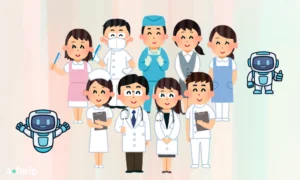The essay example below is crafted to help you with your academic assignments and needs. Whether you’re looking for inspiration, seeking to gather ideas, or wanting to understand the specific structure required for this type of writing, this sample is designed to guide you. Use it as a resource to improve your writing skills and better understand how to approach various essay formats.

✅ AI Essay Writer ✅ AI Detector ✅ Plagchecker ✅ Paraphraser
✅ Summarizer ✅ Citation Generator
Technological advancements have significantly transformed healthcare delivery, patient care, and medical research. From telemedicine to AI diagnostics and wearable health devices, these innovations are reshaping how healthcare professionals and patients interact. Understanding these changes is essential as technology continues to play a crucial role in modern healthcare.
Telemedicine has become increasingly popular, especially during the COVID-19 pandemic. This technology allows patients to consult with healthcare providers remotely, using video conferencing tools. Telemedicine has proven beneficial for patients in rural or underserved areas who may not have easy access to medical facilities. It also reduces the need for travel and minimizes the risk of exposure to infectious diseases. According to a study published in the Journal of Medical Internet Research, telemedicine consultations increased by 154% in March 2020 compared to the previous year.
AI diagnostics is another groundbreaking technology in healthcare. AI algorithms can analyze medical images, such as X-rays and MRIs, with remarkable accuracy. These tools assist radiologists in detecting conditions like cancer, fractures, and other abnormalities. A study in Nature Medicine found that an AI system developed by Google Health could detect breast cancer in mammograms with greater accuracy than human radiologists. By leveraging AI, healthcare providers can improve diagnostic accuracy and speed, leading to better patient outcomes.
Wearable health devices, such as fitness trackers and smartwatches, are becoming integral parts of personal healthcare management. These devices monitor vital signs like heart rate, blood pressure, and oxygen levels, providing real-time data to users and their healthcare providers. For instance, the Apple Watch’s ECG feature can detect irregular heart rhythms, potentially alerting users to conditions like atrial fibrillation. Wearable devices empower individuals to take proactive steps in managing their health and allow for continuous monitoring of chronic conditions.
In addition to these technologies, electronic health records (EHRs) have revolutionized how patient information is stored and accessed. EHRs provide a comprehensive digital record of a patient’s medical history, medications, and treatment plans. This centralized system facilitates better communication and coordination among healthcare providers, reducing the risk of medical errors. According to a report by the Office of the National Coordinator for Health Information Technology, 96% of non-federal acute care hospitals had adopted EHR systems by 2017.
Robotic surgery is another area where technology has made significant strides. Surgical robots, such as the da Vinci Surgical System, allow for minimally invasive procedures with greater precision and control. These robots are equipped with tiny instruments and cameras, enabling surgeons to perform complex surgeries through small incisions. Benefits of robotic surgery include reduced pain, shorter recovery times, and lower risk of complications. A study published in The Lancet found that patients who underwent robotic surgery for colorectal cancer had fewer postoperative complications compared to those who had open surgery.
Despite the numerous benefits, the integration of technology in healthcare also poses challenges. Data privacy and security are major concerns, as the increasing use of digital tools raises the risk of cyberattacks and data breaches. Ensuring that patient information remains confidential and secure is paramount. Additionally, there is a need for ongoing training and education for healthcare professionals to effectively use these technologies.
In conclusion, technology has revolutionized modern healthcare, offering innovative solutions for patient care, diagnostics, and medical research. Telemedicine, AI diagnostics, wearable health devices, EHRs, and robotic surgery are just a few examples of how technology is enhancing healthcare delivery. While challenges such as data security and the need for training persist, the potential benefits of these advancements are immense. As technology continues to evolve, it will undoubtedly play an increasingly vital role in shaping the future of healthcare.
Follow us on Reddit for more insights and updates.





Comments (0)
Welcome to A*Help comments!
We’re all about debate and discussion at A*Help.
We value the diverse opinions of users, so you may find points of view that you don’t agree with. And that’s cool. However, there are certain things we’re not OK with: attempts to manipulate our data in any way, for example, or the posting of discriminative, offensive, hateful, or disparaging material.